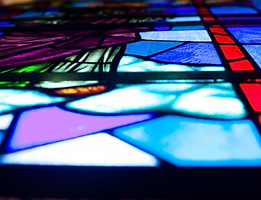Engaging the Liturgy

Liturgy is both a work of the people and a public work. Through it, we express what we believe and are formed in what we become. The more engaged we are in the liturgy, the greater our expression and formation. In the blog posts below, written for Episcopal Church Vital Practices, I describe various ways in which a congregation can be more fully engaged in the liturgy.

Fischbeck observes: "As the season of COVID stretches out, we find ourselves to be a people of longing – longing to be together, longing to worship God in song and movement, longing for the Sacrament of the Body of Christ.” In response, she shares a Liturgy of Longing with us.

All Loving God, It Is Night
After several attempts to add the daily office to the Advocate’s liturgical offerings through the years, both in person and online, Covid has given us the inclination and the desire to make it happen. Zoom has made it possible.

For nearly 40 years, Episcopalians have been giving an exchange of the Peace. In our latest blog, Lisa Fischbeck explores the practice and how we might re-work it to fit a post-plague existence.

Lisa G. Fischbeck explores an overlay between authentic acting and church in our latest blog. Being open to the spontaneous and being able to move in and out of a variety of roles are vital practices for good actors as they are for faithful living.

Lisa G. Fischbeck explores the remembrances of The Feast of All Saints and the Commemoration of all Faithful Departed in our latest blog. In many churches, both are celebrated together on All Saints Sunday, which commemorates both the Saints recognized by the Church and those departed souls we hold dear.

In A Celebration of Life to Prepare for Death, Lisa Fischbeck explores the bright side of being given enough time to prepare for death. She gives the example of a founding parishioner’s cancer diagnosis and how his family and the church came together to host a celebration of his life.

Many in the Episcopal Church have a love and appreciation of the liturgy. But there are many who are still learning its ways. Some churches have accommodated this fact by including a written guide or a handout for those looking to learn.

The Creed: Profession of Faith, Love Song and Prayer
Lisa Fischbeck talks about the Nicene Creed and its place in the liturgy. She explores how it might be a more spiritual declaration of faith if the Creed were chanted or sung instead of recited.

Easter is a day of joy and celebration, an Alleluia lived. In the Rev. Lisa Fischbeck’s church, Easter service includes a celebratory, participatory dance, making it known that faith lived in the light of the Resurrection is joyful, and that church can be fun.

After ten years of being a nomadic church, renting space from Sunday by Sunday, we finally had land. We wanted to do something to celebrate, to claim the land, to ask God’s blessing on it, on us. So we “beat the bounds.”

The Good Friday Wake: Talking about Jesus
For many, the Wake helps to make the story and Jesus more vivid and more real. More incarnate. For many, the Wake helps to form us for the Resurrection, and for the life of faith.

Sunday Morning Funeral
A funeral can be a profound expression of what we believe and what we hope. It can form or reinforce that hope where it may have grown thin. Not only does the Sunday morning context strengthen the experience of the funeral, then, but the funeral can strengthen the experience of Sunday morning as well.
